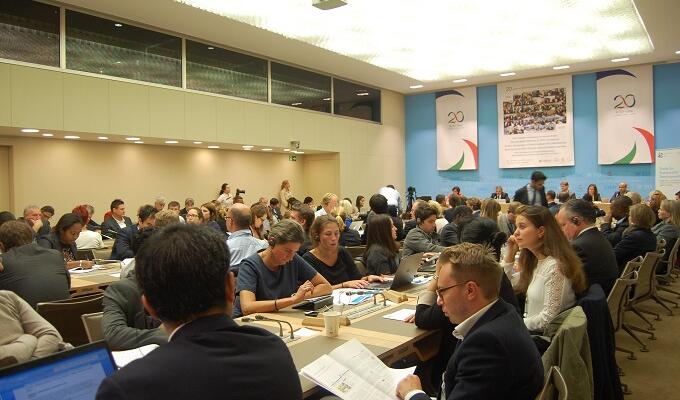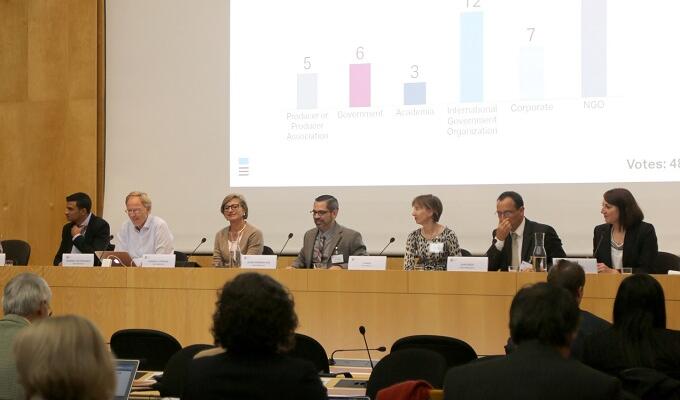


Going beyond standards certification to fuel sustainable development
Trade for Sustainable Development Forum, 1-2 October 2015
Standards are one way to drive sustainability. However, certification alone is not enough. To ensure sustainable change, all players – businesses, governments and civil society included – must find innovative ways to implement standards and communicate that information.
That was the message shared by experts at the International Trade Centre’s (ITC) Trade for Sustainable Development (T4SD) Forum 2015 on 1-2 October in Geneva, held concurrently with the World Trade Organization’s Public Forum.
In other words, making standards more visible and understandable to all involved in supply chains – by engaging with smallholders, working with government and using new technology – will ensure that sustainability standards remain relevant.
During sessions on emerging trends and challenges in sustainable trade, new initiatives involving small and medium-sized enterprises (SMEs), solutions for sustainable supply chains and key policy aspirations, participants analysed the current sustainability landscape and looked at ways to make supply chains more sustainable going forward.
Promoting sustainable development requires SMEs to meet international sustainability standards.
‘Life is not always fair,’ said Mika Vepsäläinen, Chief, Market Access Section (Economic Cooperation and Trade Division), United Nations Economic Commission for Europe (UNECE). ‘Producers must meet global – not national – standards to reach global markets. The cost of compliance must be bearable.’
Compliance isn’t easy for smallholders and SMEs. They need financial help and technical assistance to achieve certification, since most of them are not able to reach economies of scale on their own, said Charles Arden-Clarke, Head, 10YFP Secretariat, Sustainable Lifestyles, Cities and Industry, United Nations Environment Programme (UNEP).
To achieve this goal of enabling SMEs to comply with standards, it is not enough to equip national or international organizations with information and skills. There must be partnerships and strong communication with local services providers, association networks and technical resources, according to Morag Webb, Policy Advisor, COLEACP. These bodies can then transfer the information to SMEs.
‘Innovation, therefore, lies in the way that we implement sustainability standards, not in the standards themselves,’ said Mathieu Lamolle, Standards Database Coordinator, ITC Standards Map.
Governments have a major role to play in shaping the public debate to make sustainable production the norm rather than the exception, said the speakers. Policy frameworks can help bring farmers and exporters to higher capacity levels and trading performance.
Voluntary sustainability standards have to be tackled in a holistic manner, including in the context of trade policy, according to Silvia Formentini, Team Coordinator for Trade and Sustainable Development, Directorate-General for Trade, European Commission. ‘Foreign trade agreements can be a powerful tool to promote corporate social responsibility and voluntary sustainability standards.’
The German government is making moves to ensure that consumers have information on social and environmental standards, said Hendrik Schmitz Guinote, Counsellor, Development Policy, Permanent Mission of the Federal Republic of Germany to the Office of the United Nations in Geneva.
Governments should collaborate more fully with the private sector to support the development, application and promotion of sustainability standards. The speakers stressed that the participation of all actors – from producers to consumers and policymakers to certification bodies – is necessary to build more sustainable supply chains. To make this easier to do, there should be a ‘common language’ for standards, said Kristian Moeller, Secretary and Chief Executive Officer, GLOBALG.A.P.
The Trade for Sustainable Development Principles are designed to facilitate the conversation. The principles set the foundation for collaboration among organizations committed to enacting values that support sustainable trade: sustainability, transparency, harmonization and the alignment with the United Nations’ development agenda.
A new solution designed to promote transparency in supply chains is the Blue Number Initiative, launched by ITC, the United Nations Global Compact and GS1, the non-profit global organization for supply chain standards. It provides farmers and agri-businesses anywhere in the world with a unique identification number – a Blue Number – which makes their products more easily traceable. The online network will enable farmers to enhance their visibility and connect to potential customers and suppliers.
‘We must match what farmers are already doing in terms of complying with sustainability standards with what people expect,’ said Puvan J. Selvanathan, Head, ITC Office to the United Nations in New York. ‘The Blue Number Initiative is about ensuring that there is empowerment within countries as much as in global supply chains.’




